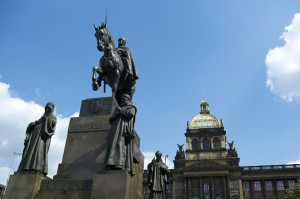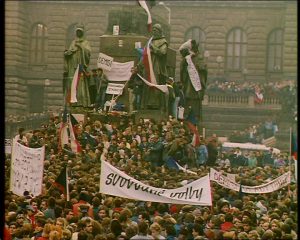November 17 – The Velvet Revolution
By Erin Naillon
November 17 is one of the landmark dates in modern Czech history. On October 28, 1918, an independent Czechoslovak state was declared just a few weeks before the end of World War I. On November 17, 1989, the state was again independent – this time, free of Communist rule.
Communism in Czechoslovakia
Following World War II, Czechoslovakia was in a fragile condition. In 1948, the Communist Party took power and held it for more than forty years. During this grey time, freedom of speech was a dream; the government controlled all media, businesses, and schools. Ordinary citizens came under suspicion if they merely had relatives living outside the Iron Curtain. A brief glimpse of freedom came in the 1960s, with a more liberal leader, but the infamous Prague Spring of 1968, and the invasion of Soviet troops, quashed this openness and the Curtain came down again.
Freedom in the Air
 In 1985, liberal-minded Soviet leader Mikhail Gorbachev took power, and increasing freedoms were introduced into countries under Communist rule. Widespread discontent with the status quo gave rise to more public grumbling – something once forbidden. On November 9, 1989, the Berlin Wall was joyfully destroyed by thousands of Germans, and footage of the destruction was broadcast worldwide.
In 1985, liberal-minded Soviet leader Mikhail Gorbachev took power, and increasing freedoms were introduced into countries under Communist rule. Widespread discontent with the status quo gave rise to more public grumbling – something once forbidden. On November 9, 1989, the Berlin Wall was joyfully destroyed by thousands of Germans, and footage of the destruction was broadcast worldwide.
Strikes
Meanwhile, back in Czechoslovakia, students gathered to observe International Students Day and to pay tribute to Czech and Slovak’s students murdered during the Nazi regime. The march made its way into the center of town, where the students were dispersed by the police, who beat many of them. The following day, the Academy of Performing Arts in Prague called for a general strike, which was supported – and joined – by theatres throughout the country.
The Movement Gains Steam
 Dissident playwright Vaclav Havel, often imprisoned for his views, was one of the key members of the Civic Forum established at this time. They demanded accountability on the part of the police for having beaten the non-violent students, as well as the release of all political prisoners. News spread; strikes became more popular. The Civic Forum gained power, and finally, Prime Minister Ladislav Adamec met with Havel on November 26.
Dissident playwright Vaclav Havel, often imprisoned for his views, was one of the key members of the Civic Forum established at this time. They demanded accountability on the part of the police for having beaten the non-violent students, as well as the release of all political prisoners. News spread; strikes became more popular. The Civic Forum gained power, and finally, Prime Minister Ladislav Adamec met with Havel on November 26.
Liberalization and Freedom
The following day, a Monday, the Ministry of Culture allowed anti-Communist works to be offered in libraries. Forty-one years of censorship had finally ended. On December 10, the first non-Communist government was sworn in. The ever-popular Havel, appropriately enough, became the first president of the newly democratic Czechoslovakia on December 29.
Due to its largely non-violent nature (the only violence shown by the police), the movement was dubbed “The Velvet Revolution”. In 1992, Slovakia made the decision to split from the Czech Republic, which occurred on January 1, 1993. Fittingly, this division is known as “The Velvet Divorce”.
November 17 is a national holiday in the Czech Republic; many government offices and businesses are closed for the day.




